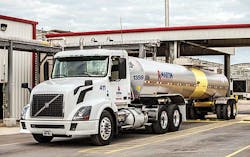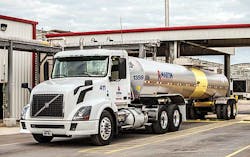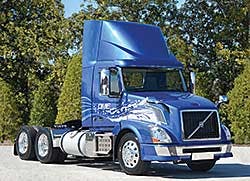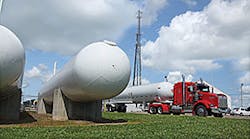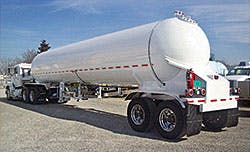RUBEN S Martin III, president and chief executive officer of Martin Resource Management, sees plenty of potential in dimethyl ether (DME) as a truck fuel alternative to diesel. In fact, Martin DME promising enough that his company recently bought a majority stake in the primary US supplier of fuel-grade DME.
Martin was fully on-board with DME even before the June announcements that Volvo Trucks North America and Mack Trucks Inc would begin offering DME-fueled trucks in 2015. Martin Resource Management subsidiary Martin Transport Inc is running three DME-fueled tractors as part of Volvo’s North American test program.
“We believe there is a large market potential for DME as a heavy-duty truck fuel,” Martin says. “This fuel is a good deal for trucking, and it should be very competitive with diesel. Our drivers who have spent time with the DME-fueled trucks say they like the performance and power of those vehicles. I would not have gotten involved with DME if I weren’t sold on it.
“I went to Sweden with some of my executive team last year to test drive some of Volvo’s European DME-fueled trucks, and we were impressed with the performance of those vehicles. We evaluated the economics of DME from all sides. We keep looking for the flaws in DME as a truck fuel, and we simply can’t find any.”
Three tractors
Martin Transport’s three Volvo DME test trucks are in daily service in East Texas hauling a range of liquid bulk cargoes, including molten sulfur. In all, the Kilgore, Texas-based tank truck carrier runs more than 500 tractors and in excess of 1,200 cargo tank vehicles. Cargoes range from crude oil to sulfuric acid.
“The DME-fueled tractors have plenty of power to pull the bulk loads,” Martin says. “We believe we can use DME-fueled trucks across a large segment of our fleet. We have local and regional hauls that should be an ideal fit as the DME fueling infrastructure evolves.”
In their effort to learn about the potential for DME, executives from the Martin organization worked closely with Volvo Truck officials. For several years, Volvo Truck has conducted extensive customer field tests of the DME technology in real-world applications, both in the United States and Europe. The truck builder has accumulated 650,000 on-highway miles with engines running on DME.
Martin Transport is among a growing number of fleets testing the fuel in real-world applications. One of the newest Volvo test fleets is Safeway Inc, one of the largest grocery retailers in North America.
Martin Transport page 2...
Next phase
Based on the results of the extensive testing, the truck builder is moving to the next phase. On June 6, Volvo Trucks announced that it would be the first heavy-duty truck builder to market DME-fueled commercial vehicles in North America. Volvo—and sister company Mack Trucks Inc—will begin limited production of DME-fueled heavy-duty trucks for the North American market in 2015.
“With the addition of DME-powered vehicles to our previously announced CNG (compressed natural gas) and LNG (liquefied natural gas) offering, Volvo’s Blue Power line-up will offer the industry’s most comprehensive approach to the developing North American alternative fuel market,” says Göran Nyberg, president of Volvo Trucks North American Sales and Marketing. “We believe the fuel shows great potential for the North American market, and when produced from biomass, it can provide a 95% reduction in CO2 compared to diesel.”
The fuel can be made from a variety of sustainable biomass sources—animal waste, food waste, and grass clippings—as well as from North America’s abundant supply of natural gas, and therefore has the potential to significantly reduce energy dependency. Converting natural gas to DME is an innovative way to address many of the distribution, storage, and fueling challenges otherwise presented by natural gas as a heavy truck fuel.
Volvo’s DME technology will be available in its D13 engine, and the company’s I-Shift automated manual transmission will be standard on DME-powered trucks. Initially, the engine will be rated for 425 horsepower with 1,750 lb-ft of torque. A 500-horsepower rating will follow.
The base engine will be almost identical to a diesel-fueled D13, according to Ed Saxman, Volvo Trucks marketing product manager for alternative fuels. The main change is a new injection system. DME is injected as a liquid.
Diesel similarity
DME mirrors the exceptional performance qualities and energy efficiency of diesel and burns cleanly without producing any soot. DME is safe to handle, store, and dispense. It is already in use as an aerosol propellant in a variety of household and cosmetic products.
Lack of soot means there is no need for a diesel particulate filter. In addition, there is no need for exhaust gas recirculation hardware including a cooler or EGR valve. A variable geometry turbocharger is not needed. However, DME engines may require selective catalytic reduction to meet NOx levels.
DME has a high cetane number that helps ensure performance and efficiency comparable to diesel, and it can be packaged densely enough on a truck to support longhaul operations, or to allow room for product pumps and other equipment on the frame.
It is an excellent compression ignition fuel which, like diesel, requires no separate ignition mechanism. Unlike LNG, it does not require cryogenic temperatures. It is handled and stored like propane, with tank pressures of only 75 psi (versus 3,600 psi for CNG). It can safely be stored on-site.
DME fuel tanks are considerably lighter than comparable CNG or LNG tanks and considerably less complex. The fuel tanks are the same as those used on propane-fueled vehicles.
Martin Transport page 3...
DME distribution
For tank truck carriers, DME could be both truck fuel and cargo. Standard MC331 tank trailers and bobtails can be used to distribute DME. The same sort of tanks could be used to store the DME at fueling locations.
“Tanks will need different seals, gaskets, and valves that are compatible with DME, but that is about it,” Martin says. “We have a large number of LP-gas trailers in the Martin Transport fleet, and we will be able to use them to transport and distribute the fuel.”
One of the benefits of DME is that it can be stored indefinitely at ambient temperatures. In addition, product transfer and vehicle fueling can be done at lower pressures.
DME is heavier than propane, however, which means it may not be possible to completely fill transport trailers currently in service. Propane weighs slightly over four pounds per gallon, while DME comes in around five pounds per gallon.
To help build the DME supply infrastructure in North America, Volvo Trucks has enlisted the help of Oberon Fuels, which is majority owned by Martin Resource Management. Oberon is the first company to announce plans to commercialize DME fuel production in North America and has developed skid-mounted, small-scale production units that cost-effectively convert biogas and natural gas to DME.
Oberon’s first plant went on line in June in the Imperial Valley region of southern California. It is producing DME from biomass Safeway’s grocery distribution operations. Located in Brawley, California, the plant will produce 4,500 gallons of fuel-grade DME daily. Subsequent units will produce up to 10,000 gallons a day.
“Our small-scale process enables the utilization of regional feedstocks to produce DME,” says Rebecca Boudreaux, president of Oberon Fuels. “Cost-effective, regional fuel production addresses the distribution issue, and offers the potential to bypass the need for a national fueling infrastructure, while reducing the carbon footprint associated with transporting the feedstock and the fuel produced.”
Martin says the cookie-cutter plants will be sized to serve about 100 trucks, but that is just the beginning. “We know the infrastructure won’t be there overnight, but the process is underway,” he says. “We are building this market the right way. We have to remember that the shift from gasoline to diesel took decades. This is no different.” ♦
About the Author
Charles Wilson
Charles E. Wilson spent 31 years covering the tank truck, tank container, and storage terminal industries throughout North, South, and Central America as the editor of Bulk Transporter. Prior to 1989, Wilson was managing editor of Bulk Transporter and Refrigerated Transporter and associate editor of Trailer/Body Builders. Before joining the three publications in Houston TX, he wrote for various food industry trade publications in other parts of the country. Wilson has a bachelor's degree in journalism from the University of Kansas and served three years in the U.S. Army.
